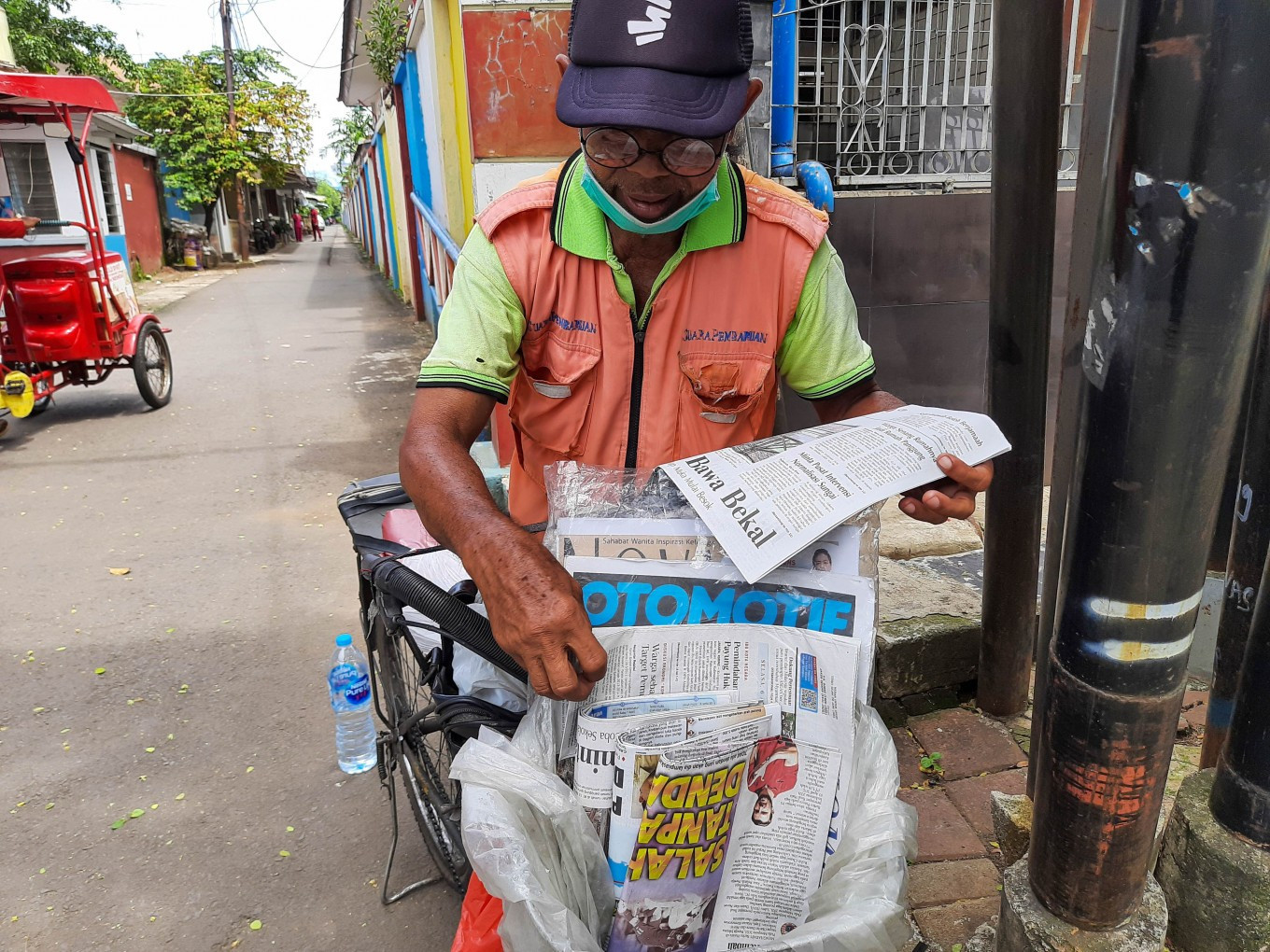News
Critical media, NGOs accused of working for foreign interests, including Soros
Tenggara Strategics April 7, 2025 Paper man: Kadum sells newspapers and magazines from his bicycle. (JP/Permata Adinda)
Paper man: Kadum sells newspapers and magazines from his bicycle. (JP/Permata Adinda)
News media outlets and civil society organizations known to be critical of the government of Prabowo Subianto are coming under attack, mostly online, with accusations that they work for foreign interests. American billionaire, investor and philanthropist George Soros has been singled out as the main culprit behind them.
The latest online attacks are typically anonymous or come from little known public figures, so they may have little credibility despite going viral. But they were encouraged by Prabowo’s statements in February claiming that foreign forces are attempting to break the nation apart and undermine his policies.
“Soon will be unveiled the CSOs that are funded by foreign governments. Soon will be unveiled news media outlets that are really owned by foreigners,” he said in off the cuff remarks addressing the meeting of the Gerindra Party which he founded and leads.
“Should I reveal their names?” he asked the crowd, which responded in the affirmative. “Well, it’s not nice in the presence of journalists.”
While they did not come from Prabowo, some of their names did become public a month later in the wake of massive student protests around the country against the House of Representatives’ endorsement of the new revisions of the Indonesian Military (TNI) Law. Critics have said the legislation would further enable the creeping militarization of the state under Prabowo, himself a retired Army general.
Tempo, the news media outlet that has had a series of brushes with the law for its bold investigative reports, has become the prime target, both offline and online.
A courier service delivered a package on March 22 to Tempo’s office in Jakarta that contained the severed head of a pig with both ears cut off. The package from an unnamed sender was addressed to a female journalist who co-hosts the popular Bocor Alus videocasting program of political insights and gossip.
The incident has been widely seen as a form of terror reminiscent of a scene from the 1970s movie The Godfather in which a severed horse head is placed in a man’s bed as a form of intimidation. A few days after the pig’s head incident, someone on a passing motorcycle threw over the fence of the Tempo office a package containing four dead rats. Police are investigating both cases following a complaint filed by Tempo. It seems unlikely they will find the culprits.
But in the meantime, Tempo has also come under attack as representing the interests of George Soros, the billionaire with a track record of bringing down governments by hitting their currency.
Viral online content says Tempo received money from the New York-based non-profit Media Development Investment Fund (MDIF), which they claim had close links with Soros. In its response, Tempo acknowledges the MDIF fund but says Soros’ fund is one of dozens of organizations that give money to invest in ensuring the independence of the recipient media in developing countries.
The names of other MDIF recipients including hukumonline.com, suara.com and katadata.co.id have also been mentioned, although they have not been criticized as harshly.
Soros became a convenient target given his history of crippling the United Kingdom’s economy in the 1990s by speculating against the pound sterling. Many have also linked him with the 1998 Asian financial crisis that not only hurt Indonesia, but also led that same year to the collapse of the Soeharto regime after more than 20 years in power.
Inevitably, this claim was revived in the current attack against Soros, and indirectly on civil society organizations that receive money from Soros’ Open Society Foundation (OSF).
These organizations are involved in the promotion of democracy, justice and the protection of basic human rights, while also expanding to climate justice and digital rights. Some of these organizations have also been named to further galvanize support for the regime against its detractors. Also, almost inevitable in the context of Indonesian politics, some accused these organizations of representing the interests of communism, a political ideology long dead in Indonesia and around the world, but always a convenient scapegoat.
A previously unknown group called the Youth Move Forum (Forum Gerak Pemuda) has called on the government to audit the finances of civil society organizations that receive OSF funding, claiming that some of the money had been used to finance the recent massive student demonstrations against the newly revised Military Law.
“We demand the Finance Minister to audit and to stop foreign aid funding to NGOs/CSOs that are creating the disruptions and obstructing the government’s work. We also ask the minister to revoke the license of these foreign affiliated organizations,” the group’s coordinator Fikri Fakhruddin told journalists.
It’s not the first time that foreign donations to Indonesian NGOs have come under the spotlight. In 2022, then-coordinating maritime affairs and investment minister Luhut Panjaitan threatened to begin auditing all NGOs that received foreign money due to suspicions of foreign meddling in Indonesian politics.
What we've heard
The Prabowo administration has once again employed the "foreign agents" narrative to counter criticism directed at the government. This narrative was previously used extensively by Prabowo when he was outside former president Joko “Jokowi” Widodo’s administration. An activist stated that the government and its allies use the "foreign agents" label against entities such as non-governmental organizations and media outlets that are critical of the government.

